- Home
- Henry James
Confidence Page 2
Confidence Read online
Page 2
Longueville shook his head.
"I never lose opportunities!"
"You might have sketched me afterwards, from memory."
Longueville looked at her, smiling.
"Judge how much better my memory will be now!"
She also smiled a little, but instantly became serious.
"For myself, it 's an episode I shall try to forget. I don't like the part I have played in it."
"May you never play a less becoming one!" cried Longueville. "I hope that your mother, at least, will accept a memento of the occasion." And he turned again with his sketch to her companion, who had been listening to the girl's conversation with this enterprising stranger, and looking from one to the other with an air of earnest confusion. "Won't you do me the honor of keeping my sketch?" he said. "I think it really looks like your daughter."
"Oh, thank you, thank you; I hardly dare," murmured the lady, with a deprecating gesture.
"It will serve as a kind of amends for the liberty I have taken," Longueville added; and he began to remove the drawing from its paper block.
"It makes it worse for you to give it to us," said the young girl.
"Oh, my dear, I am sure it 's lovely!" exclaimed her mother. "It 's wonderfully like you."
"I think that also makes it worse!"
Longueville was at last nettled. The young lady's perversity was perhaps not exactly malignant; but it was certainly ungracious. She seemed to desire to present herself as a beautiful tormentress.
"How does it make it worse?" he asked, with a frown.
He believed she was clever, and she was certainly ready. Now, however, she reflected a moment before answering.
"That you should give us your sketch," she said at last.
"It was to your mother I offered it," Longueville observed.
But this observation, the fruit of his irritation, appeared to have no effect upon the young girl.
"Is n't it what painters call a study?" she went on. "A study is of use to the painter himself. Your justification would be that you should keep your sketch, and that it might be of use to you."
"My daughter is a study, sir, you will say," said the elder lady in a little, light, conciliating voice, and graciously accepting the drawing again.
"I will admit," said Longueville, "that I am very inconsistent. Set it down to my esteem, madam," he added, looking at the mother.
"That 's for you, mamma," said his model, disengaging her arm from her mother's hand and turning away.
The mamma stood looking at the sketch with a smile which seemed to express a tender desire to reconcile all accidents.
"It 's extremely beautiful," she murmured, "and if you insist on my taking it—"
"I shall regard it as a great honor."
"Very well, then; with many thanks, I will keep it." She looked at the young man a moment, while her daughter walked away. Longueville thought her a delightful little person; she struck him as a sort of transfigured Quakeress—a mystic with a practical side. "I am sure you think she 's a strange girl," she said.
"She is extremely pretty."
"She is very clever," said the mother.
"She is wonderfully graceful."
"Ah, but she 's good!" cried the old lady.
"I am sure she comes honestly by that," said Longueville, expressively, while his companion, returning his salutation with a certain scrupulous grace of her own, hurried after her daughter.
Longueville remained there staring at the view but not especially seeing it. He felt as if he had at once enjoyed and lost an opportunity. After a while he tried to make a sketch of the old beggar-woman who sat there in a sort of palsied immobility, like a rickety statue at a church-door. But his attempt to reproduce her features was not gratifying, and he suddenly laid down his brush. She was not pretty enough—she had a bad profile.
CHAPTER II
Two months later Bernard Longueville was at Venice, still under the impression that he was leaving Italy. He was not a man who made plans and held to them. He made them, indeed—few men made more—but he made them as a basis for variation. He had gone to Venice to spend a fortnight, and his fortnight had taken the form of eight enchanting weeks. He had still a sort of conviction that he was carrying out his plans; for it must be confessed that where his pleasure was concerned he had considerable skill in accommodating his theory to his practice. His enjoyment of Venice was extreme, but he was roused from it by a summons he was indisposed to resist. This consisted of a letter from an intimate friend who was living in Germany—a friend whose name was Gordon Wright. He had been spending the winter in Dresden, but his letter bore the date of Baden-Baden. As it was not long, I may give it entire.
"I wish very much that you would come to this place. I think you have been here before, so that you know how pretty it is, and how amusing. I shall probably be here the rest of the summer. There are some people I know and whom I want you to know. Be so good as to arrive. Then I will thank you properly for your various Italian rhapsodies. I can't reply on the same scale—I have n't the time. Do you know what I am doing? I am making love. I find it a most absorbing occupation. That is literally why I have not written to you before. I have been making love ever since the last of May. It takes an immense amount of time, and everything else has got terribly behindhand. I don't mean to say that the experiment itself has gone on very fast; but I am trying to push it forward. I have n't yet had time to test its success; but in this I want your help. You know we great physicists never make an experiment without an 'assistant'—a humble individual who burns his fingers and stains his clothes in the cause of science, but whose interest in the problem is only indirect. I want you to be my assistant, and I will guarantee that your burns and stains shall not be dangerous. She is an extremely interesting girl, and I really want you to see her—I want to know what you think of her. She wants to know you, too, for I have talked a good deal about you. There you have it, if gratified vanity will help you on the way. Seriously, this is a real request. I want your opinion, your impression. I want to see how she will affect you. I don't say I ask for your advice; that, of course, you will not undertake to give. But I desire a definition, a characterization; you know you toss off those things. I don't see why I should n't tell you all this—I have always told you everything. I have never pretended to know anything about women, but I have always supposed that you knew everything. You certainly have always had the tone of that sort of omniscience. So come here as soon as possible and let me see that you are not a humbug. She 's a very handsome girl."
Longueville was so much amused with this appeal that he very soon started for Germany. In the reader, Gordon Wright's letter will, perhaps, excite surprise rather than hilarity; but Longueville thought it highly characteristic of his friend. What it especially pointed to was Gordon's want of imagination—a deficiency which was a matter of common jocular allusion between the two young men, each of whom kept a collection of acknowledged oddities as a playground for the other's wit. Bernard had often spoken of his comrade's want of imagination as a bottomless pit, into which Gordon was perpetually inviting him to lower himself. "My dear fellow," Bernard said, "you must really excuse me; I cannot take these subterranean excursions. I should lose my breath down there; I should never come up alive. You know I have dropped things down—little jokes and metaphors, little fantasies and paradoxes—and I have never heard them touch bottom!" This was an epigram on the part of a young man who had a lively play of fancy; but it was none the less true that Gordon Wright had a firmly-treading, rather than a winged, intellect. Every phrase in his letter seemed, to Bernard, to march in stout-soled walking-boots, and nothing could better express his attachment to the process of reasoning things out than this proposal that his friend should come and make a chemical analysis—a geometrical survey—of the lady of his love. "That I shall have any difficulty in forming an opinion, and any difficulty in expressing it when formed—of this he has as little idea as that he shall have any difficulty in acc
epting it when expressed." So Bernard reflected, as he rolled in the train to Munich. "Gordon's mind," he went on, "has no atmosphere; his intellectual process goes on in the void. There are no currents and eddies to affect it, no high winds nor hot suns, no changes of season and temperature. His premises are neatly arranged, and his conclusions are perfectly calculable."
Yet for the man on whose character he so freely exercised his wit Bernard Longueville had a strong affection. It is nothing against the validity of a friendship that the parties to it have not a mutual resemblance. There must be a basis of agreement, but the structure reared upon it may contain a thousand disparities. These two young men had formed an alliance of old, in college days, and the bond between them had been strengthened by the simple fact of its having survived the sentimental revolutions of early life. Its strongest link was a sort of mutual respect. Their tastes, their pursuits were different; but each of them had a high esteem for the other's character. It may be said that they were easily pleased; for it is certain that neither of them had performed any very conspicuous action. They were highly civilized young Americans, born to an easy fortune and a tranquil destiny, and unfamiliar with the glitter of golden opportunities. If I did not shrink from disparaging the constitution of their native land for their own credit, I should say that it had never been very definitely proposed to these young gentlemen to distinguish themselves. On reaching manhood, they had each come into property sufficient to make violent exertion superfluous. Gordon Wright, indeed, had inherited a large estate. Their wants being tolerably modest, they had not been tempted to strive for the glory of building up commercial fortunes—the most obvious career open to young Americans. They had, indeed, embraced no career at all, and if summoned to give an account of themselves would, perhaps, have found it hard to tell any very impressive story. Gordon Wright was much interested in physical science, and had ideas of his own on what is called the endowment of research. His ideas had taken a practical shape, and he had distributed money very freely among the investigating classes, after which he had gone to spend a couple of years in Germany, supposing it to be the land of laboratories. Here we find him at present, cultivating relations with several learned bodies and promoting the study of various tough branches of human knowledge, by paying the expenses of difficult experiments. The experiments, it must be added, were often of his own making, and he must have the honor of whatever brilliancy attaches, in the estimation of the world, to such pursuits. It was not, indeed, a brilliancy that dazzled Bernard Longueville, who, however, was not easily dazzled by anything. It was because he regarded him in so plain and direct a fashion, that Bernard had an affection for his friend—an affection to which it would perhaps be difficult to assign a definite cause. Personal sympathies are doubtless caused by something; but the causes are remote, mysterious to our daily vision, like those of the particular state of the weather. We content ourselves with remarking that it is fine or that it rains, and the enjoyment of our likes and dislikes is by no means apt to borrow its edge from the keenness of our analysis. Longueville had a relish for fine quality—superior savour; and he was sensible of this merit in the simple, candid, manly, affectionate nature of his comrade, which seemed to him an excellent thing of its kind. Gordon Wright had a tender heart and a strong will—a combination which, when the understanding is not too limited, is often the motive of admirable actions. There might sometimes be a question whether Gordon's understanding were sufficiently unlimited, but the impulses of a generous temper often play a useful part in filling up the gaps of an incomplete imagination, and the general impression that Wright produced was certainly that of intelligent good-nature. The reasons for appreciating Bernard Longueville were much more manifest. He pleased superficially, as well as fundamentally. Nature had sent him into the world with an armful of good gifts. He was very good-looking—tall, dark, agile, perfectly finished, so good-looking that he might have been a fool and yet be forgiven. As has already been intimated, however, he was far from being a fool. He had a number of talents, which, during three or four years that followed his leaving college, had received the discipline of the study of the law. He had not made much of the law; but he had made something of his talents. He was almost always spoken of as "accomplished;" people asked why he did n't do something. This question was never satisfactorily answered, the feeling being that Longueville did more than many people in causing it to be asked. Moreover, there was one thing he did constantly—he enjoyed himself. This is manifestly not a career, and it has been said at the outset that he was not attached to any of the recognized professions. But without going into details, he was a charming fellow—clever, urbane, free-handed, and with that fortunate quality in his appearance which is known as distinction.
CHAPTER III
He had not specified, in writing to Gordon Wright, the day on which he should arrive at Baden-Baden; it must be confessed that he was not addicted to specifying days. He came to his journey's end in the evening, and, on presenting himself at the hotel from which his friend had dated his letter, he learned that Gordon Wright had betaken himself after dinner, according to the custom of Baden-Baden, to the grounds of the Conversation-house. It was eight o'clock, and Longueville, after removing the stains of travel, sat down to dine. His first impulse had been to send for Gordon to come and keep him company at his repast; but on second thought he determined to make it as brief as possible. Having brought it to a close, he took his way to the Kursaal. The great German watering-place is one of the prettiest nooks in Europe, and of a summer evening in the gaming days, five-and-twenty years ago, it was one of the most brilliant scenes. The lighted windows of the great temple of hazard (of as chaste an architecture as if it had been devoted to a much purer divinity) opened wide upon the gardens and groves; the little river that issues from the bosky mountains of the Black Forest flowed, with an air of brook-like innocence, past the expensive hotels and lodging-houses; the orchestra, in a high pavilion on the terrace of the Kursaal, played a discreet accompaniment to the conversation of the ladies and gentlemen who, scattered over the large expanse on a thousand little chairs, preferred for the time the beauties of nature to the shuffle of coin and the calculation of chance; while the faint summer stars, twinkling above the vague black hills and woods, looked down at the indifferent groups without venturing to drop their light upon them.
Longueville, noting all this, went straight into the gaming-rooms; he was curious to see whether his friend, being fond of experiments, was trying combinations at roulette. But he was not to be found in any of the gilded chambers, among the crowd that pressed in silence about the tables; so that Bernard presently came and began to wander about the lamp-lit terrace, where innumerable groups, seated and strolling, made the place a gigantic conversazione. It seemed to him very agreeable and amusing, and he remarked to himself that, for a man who was supposed not to take especially the Epicurean view of life, Gordon Wright, in coming to Baden, had certainly made himself comfortable. Longueville went his way, glancing from one cluster of talkers to another; and at last he saw a face which brought him to a stop. He stood a moment looking at it; he knew he had seen it before. He had an excellent memory for faces; but it was some time before he was able to attach an identity to this one. Where had he seen a little elderly lady with an expression of timorous vigilance, and a band of hair as softly white as a dove's wing? The answer to the question presently came—Where but in a grass-grown corner of an old Italian town? The lady was the mother of his inconsequent model, so that this mysterious personage was probably herself not far off. Before Longueville had time to verify this induction, he found his eyes resting upon the broad back of a gentleman seated close to the old lady, and who, turning away from her, was talking to a young girl. It was nothing but the back of this gentleman that he saw, but nevertheless, with the instinct of true friendship, he recognized in this featureless expanse the robust personality of Gordon Wright. In a moment he had stepped forward and laid his hand upon Wright's shoulder.
&
nbsp; His friend looked round, and then sprang up with a joyous exclamation and grasp of the hand.
"My dear fellow—my dear Bernard! What on earth—when did you arrive?"
While Bernard answered and explained a little, he glanced from his friend's good, gratified face at the young girl with whom Wright had been talking, and then at the lady on the other side, who was giving him a bright little stare. He raised his hat to her and to the young girl, and he became conscious, as regards the latter, of a certain disappointment. She was very pretty; she was looking at him; but she was not the heroine of the little incident of the terrace at Siena.
"It 's just like Longueville, you know," Gordon Wright went on; "he always comes at you from behind; he 's so awfully fond of surprises." He was laughing; he was greatly pleased; he introduced Bernard to the two ladies. "You must know Mrs. Vivian; you must know Miss Blanche Evers."
Bernard took his place in the little circle; he wondered whether he ought to venture upon a special recognition of Mrs. Vivian. Then it seemed to him that he should leave the option of this step with the lady, especially as he had detected recognition in her eye. But Mrs. Vivian ventured upon nothing special; she contented herself with soft generalities—with remarking that she always liked to know when people would arrive; that, for herself, she never enjoyed surprises.
"And yet I imagine you have had your share," said Longueville, with a smile. He thought this might remind her of the moment when she came out of the little church at Siena and found her daughter posturing to an unknown painter.
But Mrs. Vivian, turning her benignant head about, gave but a superficial reply.
"Oh, I have had my share of everything, good and bad. I don't complain of anything." And she gave a little deprecating laugh.
Gordon Wright shook hands with Bernard again; he seemed really very glad to see him. Longueville, remembering that Gordon had written to him that he had been "making love," began to seek in his countenance for the ravages of passion. For the moment, however, they were not apparent; the excellent, honest fellow looked placid and contented. Gordon Wright had a clear gray eye, short, straight, flaxen hair, and a healthy diffusion of color. His features were thick and rather irregular; but his countenance—in addition to the merit of its expression—derived a certain grace from a powerful yellow moustache, to which its wearer occasionally gave a martial twist. Gordon Wright was not tall, but he was strong, and in his whole person there was something well-planted and sturdy. He almost always dressed in light-colored garments, and he wore round his neck an eternal blue cravat. When he was agitated he grew very red. While he questioned Longueville about his journey and his health, his whereabouts and his intentions, the latter, among his own replies, endeavored to read in Wright's eyes some account of his present situation. Was that pretty girl at his side the ambiguous object of his adoration, and, in that case, what was the function of the elder lady, and what had become of her argumentative daughter? Perhaps this was another, a younger daughter, though, indeed, she bore no resemblance to either of Longueville's friends. Gordon Wright, in spite of Bernard's interrogative glances, indulged in no optical confidences. He had too much to tell. He would keep his story till they should be alone together. It was impossible that they should adjourn just yet to social solitude; the two ladies were under Gordon's protection. Mrs. Vivian—Bernard felt a satisfaction in learning her name; it was as if a curtain, half pulled up and stopped by a hitch, had suddenly been raised altogether—Mrs. Vivian sat looking up and down the terrace at the crowd of loungers and talkers with an air of tender expectation. She was probably looking for her elder daughter, and Longueville could not help wishing also that this young lady would arrive. Meanwhile, he saw that the young girl to whom Gordon had been devoting himself was extremely pretty, and appeared eminently approachable. Longueville had some talk with her, reflecting that if she were the person concerning whom Gordon had written him, it behooved him to appear to take an interest in her. This view of the case was confirmed by Gordon Wright's presently turning away to talk with Mrs. Vivian, so that his friend might be at liberty to make acquaintance with their companion.

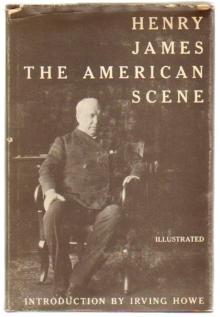 The American
The American The Wings of the Dove, Volume 1 of 2
The Wings of the Dove, Volume 1 of 2 Frost at Midnight
Frost at Midnight Morning Frost
Morning Frost The Portrait of a Lady — Volume 1
The Portrait of a Lady — Volume 1 Fatal Frost
Fatal Frost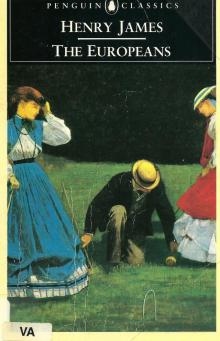 The Europeans
The Europeans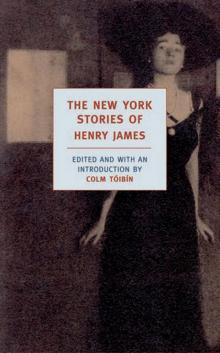 The New York Stories of Henry James
The New York Stories of Henry James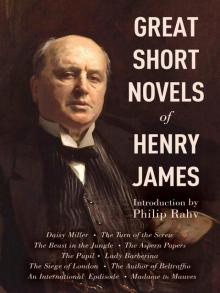 Great Short Novels of Henry James
Great Short Novels of Henry James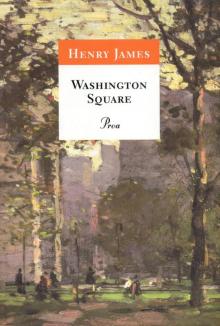 Washington Square
Washington Square The Portrait of a Lady — Volume 2
The Portrait of a Lady — Volume 2 The Ambassadors
The Ambassadors The Wings of the Dove
The Wings of the Dove The Princess Casamassima (Classics)
The Princess Casamassima (Classics) The Coxon Fund
The Coxon Fund First Frost
First Frost Henry James
Henry James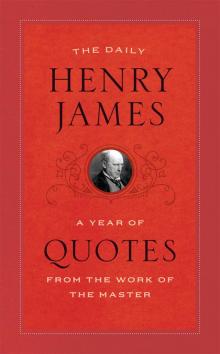 The Daily Henry James
The Daily Henry James Travels With Henry James
Travels With Henry James The Reverberator: A Novel
The Reverberator: A Novel What Maisie Knew (Henry James Collection)
What Maisie Knew (Henry James Collection)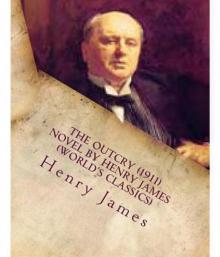 The Outcry
The Outcry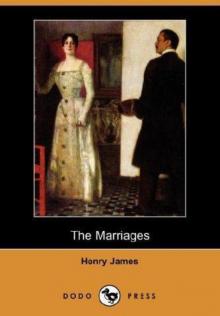 The Marriages
The Marriages The Wings of the Dove, Volume 2
The Wings of the Dove, Volume 2 The Bostonians, Vol. I
The Bostonians, Vol. I The Outcry: -1911
The Outcry: -1911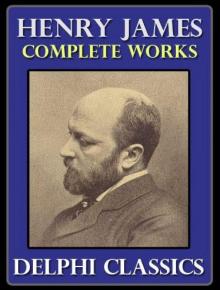 The Complete Works of Henry James
The Complete Works of Henry James Letters from the Palazzo Barbaro
Letters from the Palazzo Barbaro The Pupil
The Pupil The Bostonians, Vol. II
The Bostonians, Vol. II Pandora
Pandora Glasses
Glasses The Princess Casamassima
The Princess Casamassima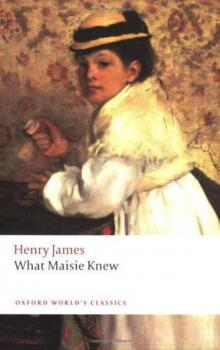 What Maisie Knew
What Maisie Knew The Reverberator
The Reverberator The Golden Bowl - Complete
The Golden Bowl - Complete Confidence
Confidence Wings of the Dove (Barnes & Noble Classics Series)
Wings of the Dove (Barnes & Noble Classics Series) The Spoils of Poynton
The Spoils of Poynton